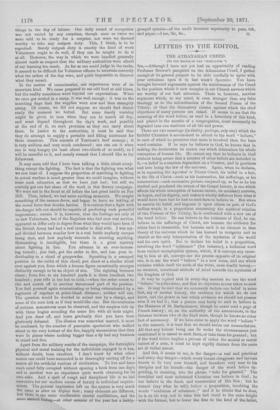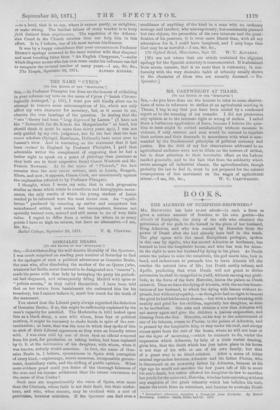LETTERS TO THE EDITOR.
THE ATHANASIAN CREED.
[TO TM EDITOR 00 T.S19 "SPOOTAT011.1
anti—Although I have not yet had an opportunity of reading Professor Brewer's pamphlet on the Athanasian Creed, I gather enough of its general purport to be able cordially to agree with your criticisms upon it in last week's Spectator. You have brought forward arguments against the maintenance of the Creed in the position which it now occupies in our Church services which are worthy of our best attention. There is, however, another argument which, to my mind, is even stronger than any false theology as to the subordination of the Second Person of the Trinity, or than the darnel:story clauses against which the chief objections of many persons are raised. It seems to me that the meaning of the word believe, as used in a formulary of this kind, and plabed iu the mouths of a congregation, must necessarily be degraded into one destitute of all life and power.
There are two meanings (in reality, perhaps, only one) which the faithful Christian is accustomed to attach to the word " believe," in each of which he perceives that more is involved than the bare word contains. If he says he believes in God, he knows that in making the declaration he makes one which determines his whole conception of human life. He cannot say that he believes in God without being aware that a number of other beliefs are included in it,--a belief in a creation dependent on a Creator, and in goodness and love being the law of the universe. Again, when he declares, as in repeating the Apostles' or Nicene Creed, his belief in a fact, in the life of Christ—such as his incarnation, his sufferings, or his resurrection—each successive picture conjured up, so far as he has studied and pondered the events of the Gospel history, is one which affects his whole conception of human nature, its necessary sorrows, its hopes, and its dignity, and makes it wholly different from what it would have been had he had no such facts to believe in. But when he asserts his belief, and imposes it upon others on pain of God's endless wrath, in a proposition concerning the mystical relation of two Persons of the Trinity, he is confronted with a new use of the word believe. He can believe in the existence of God, he can believe in the sufferings of Christ, not because the evidence for either fact is irresistible, but because each is an element in that theory of the universe which he has learned to recognize and to cherish as the only interpretation of the mysteries of the world and his own spirit. But to declare his belief in a proposition, involving the word " substance " (for instance), a technical word in an extinct metaphysical system, which, if it convoys any moan- ing to him at all, conveys one the precise opposite of its original one, is to use the word " believe" in a now souse, and one which contains within itself the seeds of the worst, most deadly heresy,— an immoral, unrational attitude of naiad towards the mysteries of the kingdom of God.
It may be replied that in every-day matters wo use the word " believe "in a like sense, and that no objection is ever taken to such use. It may be said that we commonly declare our belief iu some fact, say of secular history, the evidence for which we do not know, and the power to test which evidence we should not possess even if we had it ; that a person may fairly be said to believe in the Massacre of St. Bartholomew, though he never read a page of French history ; or, on the authority of the astronomers, in the distance between two of the fixed stars, though he knows no other fact of astronomy. If we have come to apply the word " believe " in this manner, it is time that we should revise our nomenclature. All that any human being can do under the circumstances just mentioned is to assent to such facts,or take them for granted ; but if the word believe implies a process of either the mental or moral nature of a man, it must be kept rigidly distinct from the more act of verbal assent.
And this, it seems to me, is the danger—a real and practical and every-day danger—which every honest clergyman and layman knows to lie very near himself, and therefore very near to his disciples and his friends—the danger of the word believe de-
grading, in meaning, into the phrase " take for granted." The humblest and most unlearned. Christian can believe in God ; he can believe iu the death and resurrection of His Son ; but he
cannot (say what he will) believe a proposition, involving the words " confusion of substance ;" and if he thinks that he does, he is on his way, not to raise this last creed to the same height with the former, but to lower the first to the level of the latter, —to a level, that is to say, where it cannot purify, or enlighten, or make strong. The hardest labour of every teacher is to keep faith distinct from acquiescence. The repetition of the Athana- sian Creed in the Church services does not help him in this effort. It is, I believe, one of his most serious hindrances.
It was by a happy coincidence that your comments on Professor Brewer's apology occurred in the same number with that eloquent and most touching letter from " An English Clergyman,"—under whioh disguise no one who has ever come under his influence can fail to recognize the revered teacher of many years.—I am, Sir, &c.,
The Temple, September 26, 1871. ALFRIM AINGER.































 Previous page
Previous page